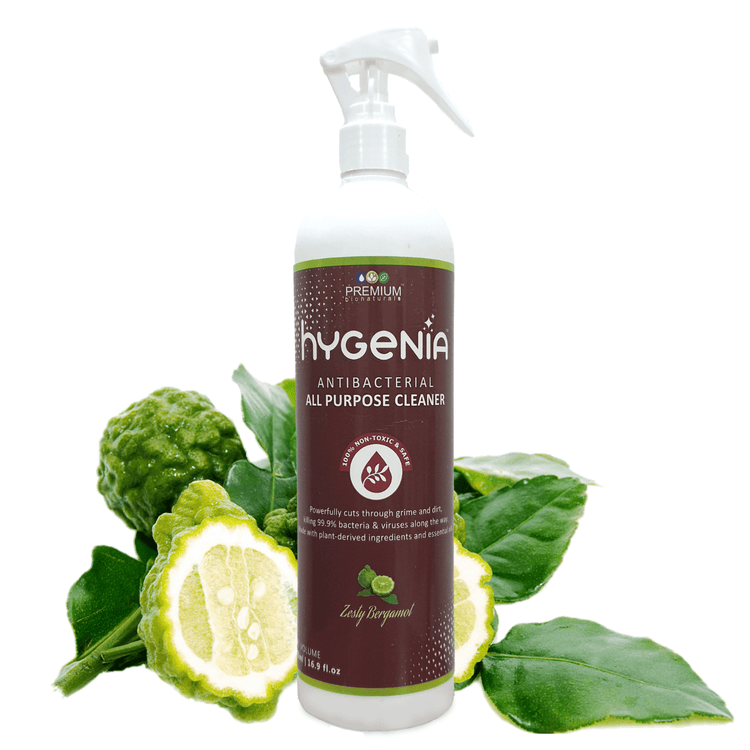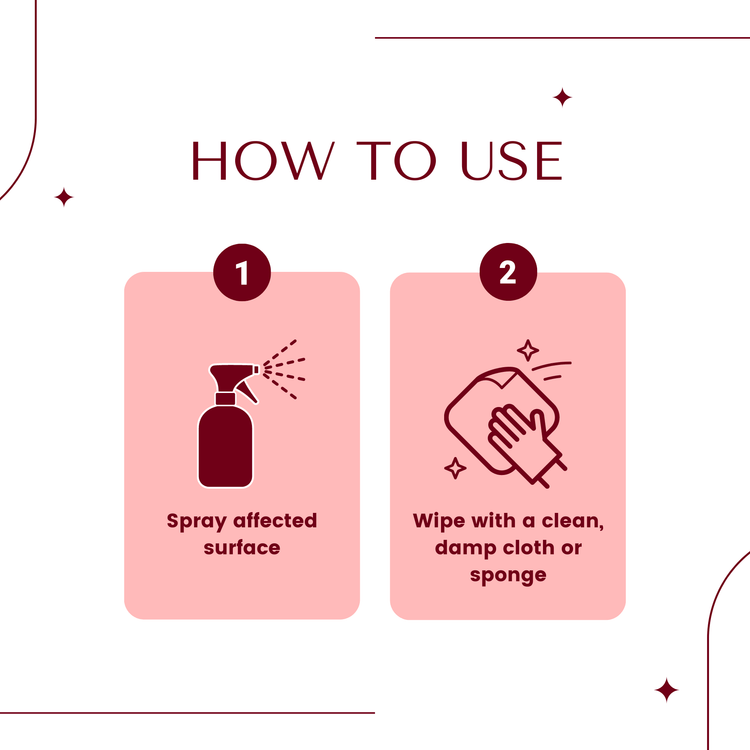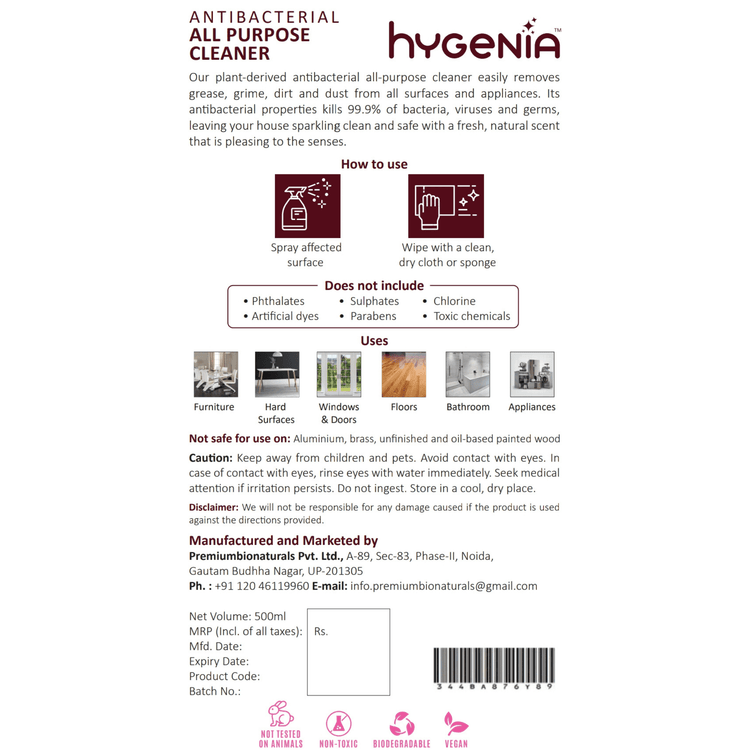"Yikes!" That’s the sound you definitely don’t want to hear when your little one is exploring their latest ‘taste test’. Whether it’s munching on a stray sock or eyeing the remote like it's a snack, we’ve all been there. But don't worry, we’re here to help you keep those “What did they just eat?!” moments to a minimum with the help of eco-friendly cleaning products. As a parent, ensuring a non-toxic and chemical-free environment for your kids is a priority. Save yourself from some “oops” moments, and learn about how to detox your home for the little one.
Always Choose Non-Toxic Cleaning Supplies
Unfortunately, your trusty germ-fighting buddies— floor cleaners, detergents, dishwashing liquids—could also be poisoning your baby. Cleaning your home is essential, but cleaning supplies contain harsh chemicals that can leave behind harmful residue. These can be unsafe, especially when kids are playing or crawling on surfaces or floors.
- Always choose non-toxic and chemical-free cleaning products.
- Switch to plant-based cleaning products like our Natural Floor Cleaner, which is eco friendly, kid-safe, and organic. Our products are non-toxic and don’t leave behind any chemical residue on your clothes, floors, or hands. Furthermore, these plant-based floor cleaners are not only safe for your tiny tot but also safeguard your floor.
Switching to plant-based cleaning supplies will significantly reduce the risk of your child being exposed to a toxin from the surface residue, ensuring they are safe while playing and crawling.
Say No to Plastic
We all know that plastic is harmful to the environment. It takes years for it to decompose and has harmed many sea creatures. But have you ever wondered why plastic could be bad for you?
- Since it is reinforced with chemical additives, sustained usage of plastic can cause infertility, cancer, or neurological disorders.
- The chances of these chemicals leaching into your food or beverages are higher when the plastic is heated. We suggest you keep your plastics out of the microwave. Use glass or stainless-steel containers for food storage.
- Use cloth shopping bags instead of plastic ones to minimise plastic waste in your home.
By reducing plastic usage, you’re not only creating a safe environment but also teaching your kids the importance of protecting our planet. Small changes can make a big difference in your home’s safety!
PRO TIP: Consider going old-school with your child’s toys. Rediscover wooden trains and jute dolls with them.
Keep Medicines Out of Reach
Looks like candy… tastes like death? But your babies don’t know that! They’re attracted to those brightly coloured capsules and are willing to try them all.
- Store all medicines, vitamins, and supplements in locked cabinets or out of reach of children.
- Use child-proof lids for all medication containers.
- Throw away all expired or unused medicines properly to avoid accidental consumption.
Teaching kids early on about the dangers of medicines can also help prevent mishaps in the future.
Dust Can Be a Hidden Danger in Your Home
Dust could be toxic to your child. We often think of dust as harmless, but in reality, it's a mixture of many particles, including harmful toxicants like lead.
- You must regularly dust and vacuum to reduce the risk, particularly in areas where children play.
- Wiping down surfaces with a damp cloth rather than a dry one to avoid spreading dust around.
- Dust may contain harmful chemicals like lead and many other, especially if you live in an older home.
Don't underestimate the risks of dust. Use chemical-free and non-toxic cleaning products like our Hygenia Antibacterial All-Purpose Cleaner to safely remove dust without adding more toxins.
How to Handle Accidental Mishaps with Your Little One?
It’s impossible to supervise your child 24x7. No matter how hard you try, you’re bound to have some “oops” moments with your child. This doesn’t make you a bad parent! But, knowing how to tackle those moments makes you a well-prepared one.
1) Don’t panic! Panic causes paralysis. Your baby needs you to stay calm and take immediate action.
2) Equip yourself with information. Read the ingredients on the back of the product that has been ingested, inhaled, or splashed.
3) Be prompt. Rinse out your child’s eyes if they’ve splashed themselves with something toxic. Take them out for some fresh air if they’ve inhaled toxic fumes.
4) Maintain a first aid kit. Have basic baby-friendly medicine on hand, in addition to bandages, alcohol wipes, and antibiotic ointments. You should also consider learning or brushing up on your CPR skills.
Frequently Asked Questions:
Q1) How can I keep my home safe for kids?
A) Using safe cleaning products, and locking away hazardous materials, can keep your home safe for kids.
Q2) How to detect toxins in your home?
A) You can have the indoor air in your home tested to see what chemicals are in it.
Q3) How do you detox your home?
A) Adding some house plants and greenery to your home goes over and above simply just looking pretty, they can also help to detoxify the home environment.
Q4) How to keep children safe from chemicals?
A) Don't leave toxic items unattended, particularly where children can reach them, even for a moment. Put them away immediately after use and secure any child safety caps.
Your child’s safety needs will change as they grow up. As a rule, infants need protection from safety hazards. Toddlers and preschoolers need supervision. And school-aged kids need help learning how to stay safe. Use every opportunity to teach your children, in an age-appropriate manner, how to be safe. Creating a non-toxic, chemical-free environment for your children doesn’t have to be complicated.
For more tips, check out our previous blog on how to identify genuine eco-friendly products and continue your journey to a healthier, toxin-free home! We hope that we’ve helped you avoid a few unexpected mishaps. Good luck for the ones you are destined to face.














